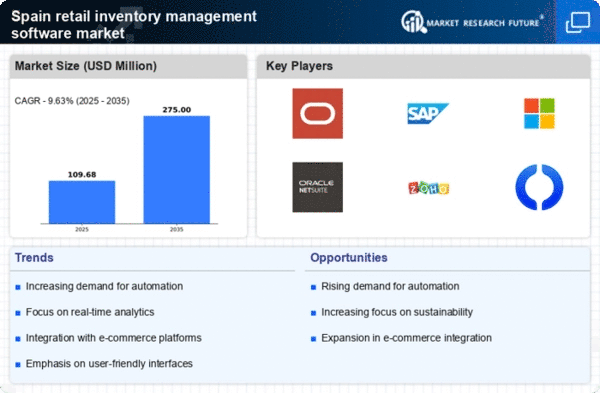Consumer Behavior Shifts
Shifts in consumer behavior are significantly impacting the retail inventory-management-software market in Spain. As consumers become more discerning and demand greater transparency regarding product availability, retailers must adapt their inventory management practices accordingly. This trend is prompting businesses to invest in software solutions that provide real-time inventory visibility and accurate stock information. In 2025, it is estimated that 40% of consumers in Spain will prioritize retailers that offer transparent inventory data. Consequently, the retail inventory-management-software market is expected to expand as companies strive to meet evolving consumer expectations.
Rising E-commerce Demand
the retail inventory management software market in Spain is surging due to increasing demand for e-commerce solutions.. As online shopping continues to gain traction, retailers are compelled to adopt sophisticated inventory management systems to streamline operations. In 2025, e-commerce sales in Spain are projected to reach approximately €20 billion, indicating a robust growth trajectory. This shift necessitates the integration of advanced software that can efficiently manage stock levels, track shipments, and optimize supply chains. Consequently, the retail inventory-management-software market is likely to expand as businesses seek to enhance their online presence and improve customer satisfaction through effective inventory control.
Focus on Operational Efficiency
The pursuit of operational efficiency is a critical driver for the retail inventory-management-software market in Spain. Retailers are increasingly recognizing the importance of optimizing their inventory processes to reduce costs and improve service levels. By implementing advanced inventory management systems, businesses can minimize stockouts, reduce excess inventory, and enhance overall productivity. In 2025, it is projected that companies focusing on operational efficiency will experience a 20% reduction in inventory holding costs. This emphasis on efficiency is likely to propel the growth of the retail inventory-management-software market as businesses seek to streamline their operations.
Regulatory Compliance and Standards
The retail inventory-management-software market in Spain is also driven by the need for compliance with various regulatory standards. Retailers are required to adhere to strict guidelines regarding inventory tracking, reporting, and data management. This regulatory landscape compels businesses to invest in robust inventory management solutions that ensure compliance and mitigate risks. In 2025, it is anticipated that compliance-related investments will account for approximately 15% of total software expenditures in the retail sector. As a result, the retail inventory-management-software market is likely to grow as companies prioritize compliance and seek reliable software solutions.
Technological Advancements in Software
Technological innovations are significantly influencing the retail inventory-management-software market in Spain. The introduction of artificial intelligence (AI) and machine learning (ML) capabilities is transforming how retailers manage their inventory. These technologies enable predictive analytics, which assists businesses in forecasting demand and optimizing stock levels. In 2025, it is estimated that around 30% of retailers in Spain will implement AI-driven inventory solutions, enhancing operational efficiency. As these advancements continue to evolve, the retail inventory-management-software market is expected to witness increased adoption, as companies strive to leverage technology for competitive advantage.
















